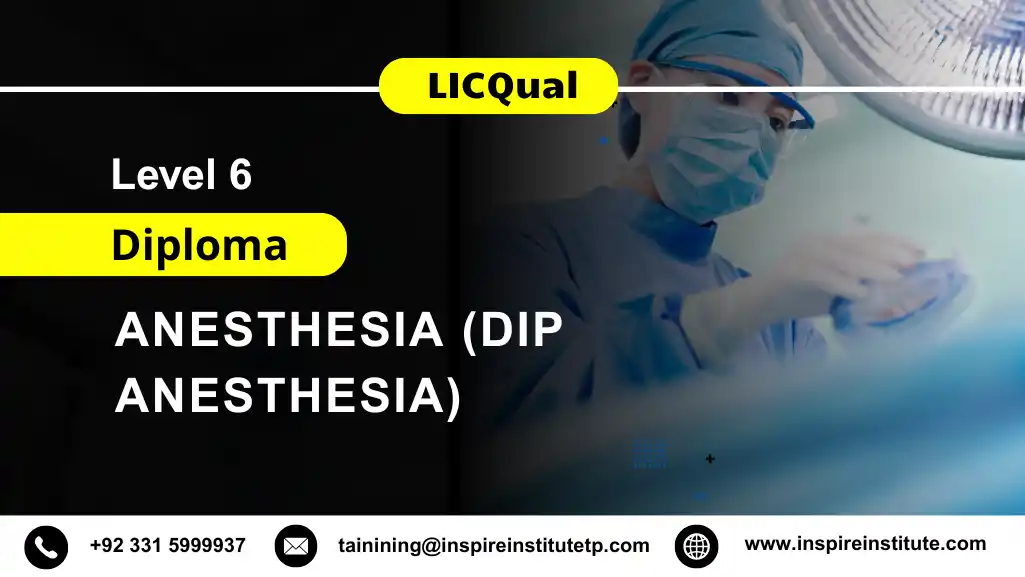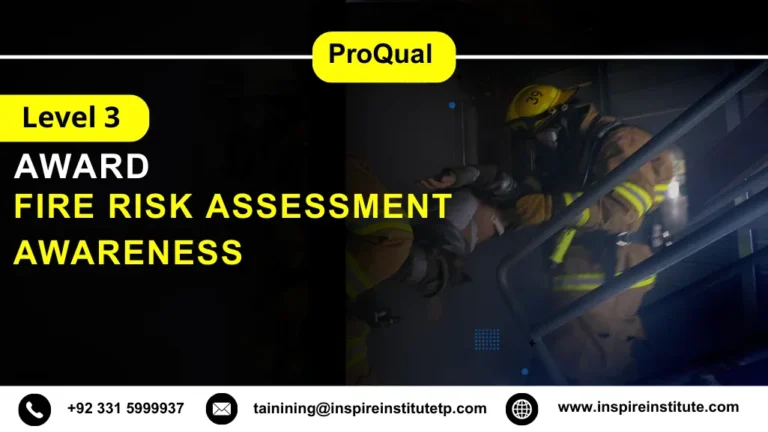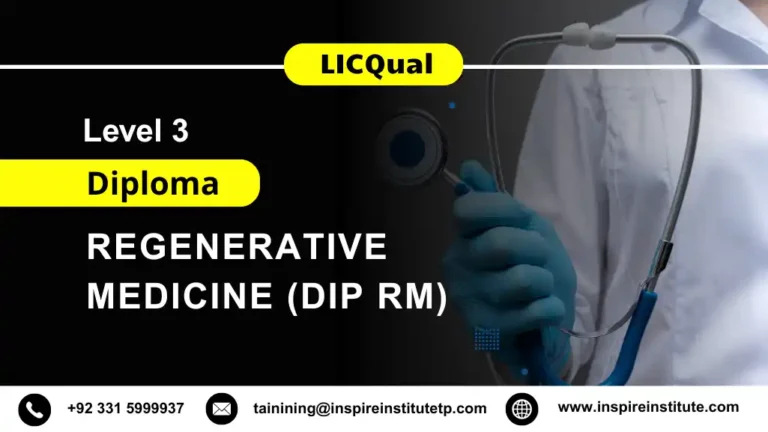LICQual Level 6 Diploma in Anesthesia (Dip Anesthesia)
The LICQual Level 6 Diploma in Anesthesia (Dip Anesthesia) is a UK-accredited, advanced qualification crafted for medical practitioners, nurse anesthetists, and perioperative professionals who seek to deepen their mastery in anesthesia practice. In an era of increasingly complex surgeries and evolving patient safety demands, this diploma strengthens your ability to deliver safe, effective, and evidence-based anesthesia care. It bridges theory and hands-on experience so that learners can confidently manage anaesthetic techniques across diverse clinical settings.
This Diploma in Anesthesia offers a broad but rigorous scope: it covers the foundational science of anesthesia (anatomy, physiology, pharmacology), modern anesthesia techniques (general, regional, sedation), airway and ventilation management, critical care and perioperative medicine, plus monitoring and patient safety protocols. Through research-led modules and clinically relevant assignments, the course equips practitioners to make informed decisions in high-pressure environments.
Learners will acquire essential knowledge such as pharmacokinetics of anesthetic agents, physiology of respiratory and cardiovascular systems under anesthesia, and the principles of multimodal analgesia. They will also develop advanced clinical skills in airway insertion, regional block techniques, ventilator management, and intraoperative monitoring. The Dip Anesthesia emphasizes competency in sedation levels, anesthetic depth control, and crisis management scenarios in operating theatres and intensive care.
The LICQual Level 6 Diploma in Anesthesia is tailored to practising clinicians who wish to enhance their qualifications without sacrificing professional duties. Delivered through a flexible, assignment-based format, the course allows study alongside your clinical workload. The structured support from expert mentors ensures steady progress while you continue to serve patients.
Why Choose this Qualification
The LICQual Level 6 Diploma in Anesthesia (Dip Anesthesia) is a UK-accredited professional qualification that equips healthcare professionals, anesthetists, and clinical practitioners with advanced knowledge and hands-on expertise in the field of anesthesia. This qualification bridges theoretical foundations with practical applications, empowering learners to deliver safe, effective, and evidence-based anesthesia care across diverse clinical environments. By combining flexible study methods and industry-aligned standards, this diploma prepares learners for leadership roles in modern anesthesia practice.
Key Reasons to Choose this Qualification
1. Comprehensive Theoretical and Clinical Knowledge
- Gain in-depth understanding of core anesthesia concepts including pharmacology, physiology, and patient monitoring.
- Study anesthesia techniques such as general, regional, and local anesthesia with detailed practical insights.
- Explore advanced modules covering pain management, airway management, and anesthesia equipment handling.
- Understand global standards in anesthesia care and apply them to different clinical scenarios.
- Learn to integrate evidence-based practice for better patient outcomes and safety.
2. Practical Skill Development
- Develop hands-on skills in pre-operative assessment, anesthetic administration, and post-operative care.
- Enhance your ability to manage critical cases, emergency resuscitation, and patient stabilization.
- Gain proficiency in using modern anesthesia machines, ventilators, and monitoring tools.
- Participate in simulation-based case studies that reflect real-world clinical challenges.
- Apply best practices in multidisciplinary anesthesia and surgical teams.
3. Globally Recognised Qualification
- Earn a UK-accredited certification respected by healthcare institutions worldwide.
- Align your professional profile with international anesthesia and perioperative standards.
- Enhance your employability in hospitals, surgical centres, and global healthcare organisations.
- Boost your credibility and competitiveness in both public and private healthcare sectors.
- Open doors to advanced postgraduate study and specialist training opportunities.
4. Evidence-Based and Research-Driven Training
- Learn from recent research, clinical studies, and international guidelines in anesthesia practice.
- Gain the ability to critically evaluate scientific literature and apply validated clinical procedures.
- Explore topics like multimodal analgesia, patient safety frameworks, and perioperative protocols.
- Strengthen analytical and decision-making skills through research-informed assignments.
- Promote continuous improvement in clinical performance through data-driven learning.
5. Flexible and Professional Learning Structure
- Designed for working professionals seeking academic advancement without leaving their practice.
- Study at your own pace through a structured, assignment-based approach.
- Access digital learning resources, online modules, and dedicated academic support.
- Engage with expert mentors offering guidance throughout your learning journey.
- Balance your career commitments while achieving a globally recognised qualification.
6. Career Advancement Opportunities
- Qualify for roles such as Anesthetic Practitioner, Clinical Educator, or Operating Theatre Specialist.
- Increase your professional scope in anesthesia, intensive care, and pain management departments.
- Strengthen your potential for leadership roles in perioperative and surgical care settings.
- Gain eligibility for further postgraduate qualifications and international certifications.
- Broaden your employability in both clinical and academic healthcare sectors.
7. Ethical and Patient-Centred Practice
- Learn to uphold ethical standards in all stages of anesthesia care and patient management.
- Understand the importance of informed consent, patient autonomy, and compassionate care.
- Promote dignity, empathy, and communication in high-stress surgical environments.
- Develop professional accountability and clinical responsibility.
- Foster cultural sensitivity and respect in diverse patient populations.
8. Continuous Professional Development
- Strengthen your professional portfolio with a high-level qualification in clinical anesthesia.
- Enhance lifelong learning, reflective practice, and skill refinement in healthcare delivery.
- Participate in case reviews, quality audits, and learning discussions to build expertise.
- Keep pace with evolving technologies, anaesthetic drugs, and global healthcare standards.
- Become part of a professional network committed to excellence in anesthesia practice.
The LICQual Level 6 Diploma in Anesthesia (Dip Anesthesia) is a gateway to professional excellence, designed to develop highly skilled, ethical, and competent anesthesia practitioners. Through a blend of academic rigour, clinical relevance, and flexibility, this qualification empowers learners to make a lasting impact in patient safety, surgical care, and the broader field of medical science. practice worldwide.
Course Overview
LICQual UK Awarding Body
Average Completion Time:
6-24 Months
Study Units: 6 Units
Evidence & Assignment Based
Mandatory Units
Who Should Take This Course
The LICQual Level 6 Diploma in Anesthesia (Dip Anesthesia) is a UK-accredited professional qualification designed for individuals seeking to expand their expertise in clinical anesthesia and perioperative care. This diploma provides a comprehensive understanding of anesthetic principles, patient safety, and evidence-based clinical practice. It is ideally suited for healthcare professionals committed to improving patient outcomes, enhancing their clinical competence, and pursuing leadership roles in the field of anesthesia. The course’s assignment-based structure and flexible learning pathway make it accessible for both experienced professionals and aspiring practitioners seeking academic and career advancement.
This course is suitable for
1. Medical Practitioners and Clinicians
- Designed for doctors, physicians, and clinical officers aiming to specialise in anesthesia and perioperative medicine.
- Enhances existing medical knowledge with advanced anesthesia techniques and patient monitoring strategies.
- Equips clinicians with the ability to assess patient risk and deliver tailored anesthetic care.
- Promotes evidence-based decision-making in both elective and emergency surgical settings.
- Strengthens leadership and interdisciplinary communication within surgical and critical care teams.
2. Nurse Anesthetists and Perioperative Nurses
- Ideal for nurses involved in anesthesia administration, surgical assistance, or operating theatre support.
- Builds expertise in pre-operative assessment, intraoperative care, and post-anesthesia recovery management.
- Develops practical skills in pain control, sedation, and patient safety monitoring.
- Reinforces teamwork and effective coordination with surgeons and anesthetists during procedures.
- Prepares nurses for supervisory or senior clinical roles in anesthesia and operating departments.
3. Allied Health Professionals
- Suitable for paramedics, critical care technologists, and other healthcare specialists seeking anesthesia knowledge.
- Provides a strong foundation in airway management, pharmacology, and perioperative care techniques.
- Encourages interdisciplinary learning and collaboration within multidisciplinary healthcare teams.
- Enhances readiness to assist in surgical emergencies and critical patient scenarios.
- Strengthens professional adaptability in various hospital and clinical environments.
4. Healthcare Educators and Trainers
- Beneficial for medical and nursing educators who wish to incorporate anesthesia and patient safety training into their teaching.
- Offers updated, evidence-based content aligned with global clinical education standards.
- Enhances instructional strategies for teaching anesthesia, resuscitation, and critical care management.
- Enables educators to mentor and assess students effectively in practical learning environments.
- Builds leadership competence in academic and clinical training institutions.
5. Public and Private Healthcare Employees
- Designed for healthcare professionals working in hospitals, surgical centres, or community healthcare settings.
- Enhances professional skills needed to ensure safe anesthesia practices and patient-centered care.
- Encourages continuous improvement and adherence to international safety standards.
- Strengthens professional credibility within healthcare systems worldwide.
- Prepares learners for cross-functional roles in hospital management and quality assurance.
6. International Healthcare Professionals
- Ideal for overseas-trained doctors and nurses seeking UK-accredited recognition in anesthesia.
- Equips learners with global anesthesia standards, ethics, and patient care models.
- Facilitates smooth integration into international healthcare systems and professional practice.
- Encourages cross-cultural competence in patient communication and teamwork.
- Supports global career mobility and higher employment opportunities.
7. Graduates Aspiring to Enter Clinical Practice
- Suitable for graduates with degrees in medicine, nursing, or health sciences aspiring to enter the anesthesia field.
- Provides foundational understanding of anesthetic principles and procedures.
- Offers exposure to practical, case-based learning in patient management.
- Prepares learners for entry-level clinical or academic positions in anesthesia.
- Acts as a stepping stone for further postgraduate or specialist medical training.
8. Professionals Seeking Career Advancement
- Perfect for those aiming to advance into senior or specialised anesthesia roles.
- Builds advanced competencies in clinical leadership, safety management, and patient care ethics.
- Enhances employability in hospitals, research institutions, and educational organisations.
- Encourages continuous learning and reflective practice in anesthesia and critical care.
- Strengthens credentials for global recognition and higher professional standing.
The LICQual Level 6 Diploma in Anesthesia (Dip Anesthesia) is ideal for healthcare professionals and aspiring anesthetists dedicated to delivering excellence in patient care. Whether learners are enhancing current practice or pursuing new opportunities, this diploma provides the academic depth, clinical precision, and global credibility needed to excel in the dynamic field of anesthesia and perioperative medicine.ment of mental health on both national and global levels.
Course Benefits
The LICQual Level 6 Diploma in Anesthesia (Dip Anesthesia) is a UK-accredited qualification designed for healthcare professionals, anesthetists, and clinical practitioners who aim to advance their expertise in anesthesia science, patient safety, and perioperative care. This comprehensive, assignment-based diploma combines theoretical learning with practical applications, enabling learners to deliver effective, evidence-based anesthesia management across various clinical settings. Through flexible and research-informed training, the qualification prepares professionals to meet international healthcare standards and ensure safe anesthesia practices that enhance patient outcomes.
Key Benefits of the Course
- Specialist Knowledge:
Gain an in-depth understanding of anesthesia principles, pharmacology, physiology, and patient monitoring systems. Learners explore vital topics such as pain management, airway control, regional and general anesthesia techniques, and anesthetic equipment handling. The Diploma in Anesthesia also covers emergency response, perioperative care, and patient assessment, equipping learners to provide safe, effective, and compassionate anesthesia care in both elective and critical cases. - Practical Application:
Develop advanced clinical and technical skills through case studies, simulations, and applied learning experiences. Learners will strengthen their ability to manage anesthesia procedures, respond to emergencies, and optimize perioperative care. The LICQual Level 6 Diploma in Anesthesia (Dip Anesthesia) ensures that learners can confidently perform under pressure, manage complex cases, and apply best practices in patient safety, teamwork, and clinical decision-making. - Recognised Qualification:
Earn a UK-accredited and globally recognised diploma that validates your clinical expertise and professional competence in anesthesia. The LICQual Level 6 Diploma in Anesthesia meets international standards of healthcare education, enhancing your credibility in hospital, academic, and research environments. This certification opens diverse opportunities in anaesthetic practice, perioperative management, critical care, and medical education. - Flexible Learning Pathway:
The programme is designed to accommodate working healthcare professionals seeking academic advancement without interrupting their careers. The assignment-based learning structure enables learners to progress at their own pace while receiving structured guidance, online resources, and expert mentorship. The Diploma in Anesthesia allows for a seamless integration of study, work, and personal development. - Evidence-Based Training:
Engage with the latest research, clinical innovations, and best-practice guidelines in anesthesia and patient safety. The course focuses on evidence-based strategies to manage anesthesia procedures, post-operative recovery, and critical care. Learners will develop analytical and problem-solving skills to evaluate clinical data, implement validated protocols, and continuously improve anesthesia outcomes. - Career Development:
Expand your career opportunities across hospitals, surgical centres, research institutions, and educational bodies. Graduates can pursue roles such as Anesthetic Practitioner, Clinical Specialist, Pain Management Consultant, or Educator. The Diploma in Anesthesia also lays the foundation for postgraduate studies, advanced clinical fellowships, or specialisation in anesthesia and critical care medicine. - Enhanced Patient and Clinical Impact:
Learn to deliver safe, ethical, and patient-centred anesthesia care while collaborating within multidisciplinary surgical teams. This diploma builds expertise in managing patient comfort, reducing surgical risks, and ensuring high standards of perioperative care. Graduates are equipped to promote clinical excellence and contribute to the advancement of healthcare practices globally. - Professional Growth:
Develop leadership, communication, and reflective practice skills essential for modern anesthesia professionals. The LICQual Level 6 Diploma in Anesthesia (Dip Anesthesia) encourages critical thinking, ethical awareness, and evidence-based decision-making, preparing learners to take on senior roles in healthcare systems. Graduates emerge as confident, competent professionals dedicated to upholding the highest standards of patient safety and clinical care.
The LICQual Level 6 Diploma in Anesthesia (Dip Anesthesia) empowers healthcare professionals to become leaders in anesthesia and perioperative care through advanced knowledge, clinical expertise, and internationally recognised credentials. It enhances both professional growth and patient safety while contributing meaningfully to the global advancement of medical excellence and anesthesia practice.
Eligibility Criteria
The LICQual Level 6 Diploma in Anesthesia (Dip Anesthesia) is a UK-accredited qualification designed for healthcare professionals and aspiring anaesthetists aiming to enhance their expertise in anaesthetic practice and perioperative care. This assignment-based course combines theoretical knowledge with practical application, preparing learners to manage patients safely and effectively throughout surgical procedures.
Educational Background:
Applicants should hold a recognised qualification in medicine, nursing, anaesthesia technology, or healthcare sciences. A Level 5 diploma or equivalent qualification in anaesthesia or related fields is also acceptable. International candidates will be assessed to ensure their qualifications meet UK standards.
Professional Experience:
A minimum of one year of clinical experience in anaesthesia, surgery, or critical care is recommended. Previous exposure to perioperative care or pain management is advantageous but not mandatory. Highly motivated individuals without prior experience are also encouraged to apply.
Age Requirement:
Applicants must be at least 18 years old at the time of enrolment. This ensures learners have the maturity and professional responsibility needed for advanced studies and clinical practice in anaesthesia.
Language Proficiency:
As the course is conducted in English, applicants must demonstrate strong communication and comprehension skills. Non-native speakers should have a minimum IELTS score of 6.0 or an equivalent qualification to ensure effective participation.
Technical Requirements:
Learners must have access to a computer or laptop with reliable internet connectivity for online learning. Basic computer literacy is essential for accessing study materials, conducting research, and submitting assignments.
Required Documents:
Applicants must provide the following during registration:
Valid ID card or passport for identification.
Academic transcripts or certificates of previous qualifications.
Proof of professional experience in healthcare or anaesthesia (if applicable).
The LICQual Level 6 Diploma in Anesthesia (Dip Anesthesia) provides an excellent opportunity for professionals to advance their knowledge, enhance clinical competence, and build a globally recognised career in anaesthesia and perioperative medicine.
The Qualification Process
LICQual Level 6 Diploma in Anesthesia (Dip Anesthesia) follows a structured pathway to ensure learners gain comprehensive knowledge, practical skills, and professional competence in community oral healthcare.
Step 1: Self-Assessment
Learners review the entry requirements to confirm eligibility. Candidates with a background in dentistry, oral health, or public health are encouraged to apply.
Step 2: Registration
Complete the registration process by submitting required documents such as proof of qualifications, a valid ID, and payment of enrollment fees.
Step 3: Induction
An induction session is conducted to:
- Verify learner eligibility and documentation.
- Introduce study materials, learning outcomes, and assessment procedures.
Step 4: Learning and Evidence Submission
Learners complete assignments, case studies, and practical exercises demonstrating competence in public health dentistry, community oral health assessment, preventive strategies, and program planning.
Step 5: Feedback and Revision
Assessors review submitted evidence and provide constructive feedback. Learners can revise and resubmit work to meet all required standards.
Step 6: Competence Validation
Final submissions are evaluated to confirm that learners have met all theoretical and practical learning outcomes.
Step 7: Internal Quality Assurance (IQA)
The IQA team reviews the assessment process to ensure accuracy, fairness, and compliance with international standards.
Step 8: External Verification (EQA)
External verifiers validate the authenticity and quality of learner achievements.
Step 9: Certification
Upon successful verification, learners are awarded LICQual Level 6 Diploma in Anesthesia (Dip Anesthesia) , demonstrating advanced proficiency in community oral healthcare and preparing them for professional growth in dental public health, preventive dentistry, and healthcare policy.







